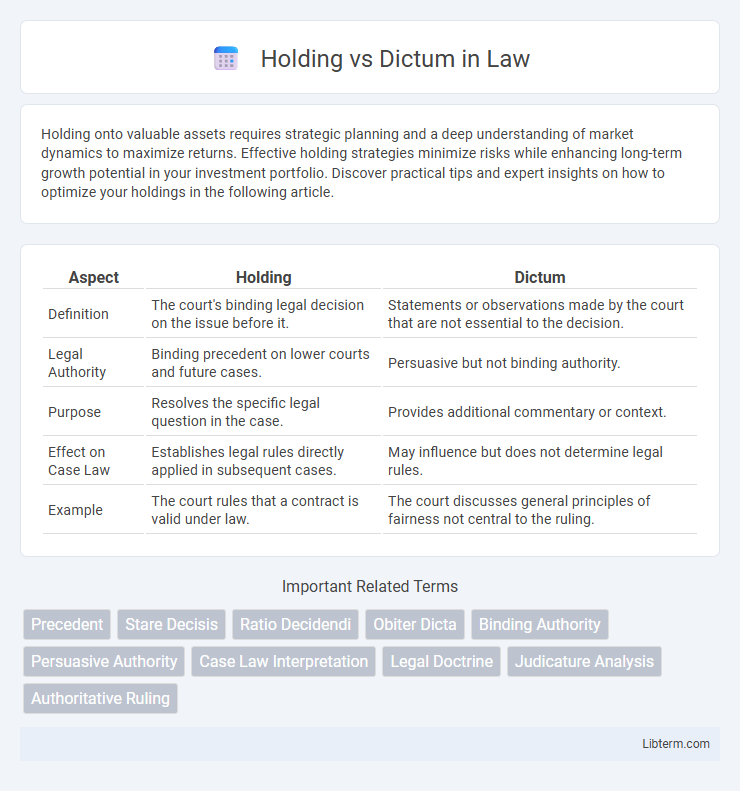Holding onto valuable assets requires strategic planning and a deep understanding of market dynamics to maximize returns. Effective holding strategies minimize risks while enhancing long-term growth potential in your investment portfolio. Discover practical tips and expert insights on how to optimize your holdings in the following article.
Table of Comparison
| Aspect | Holding | Dictum |
|---|---|---|
| Definition | The court's binding legal decision on the issue before it. | Statements or observations made by the court that are not essential to the decision. |
| Legal Authority | Binding precedent on lower courts and future cases. | Persuasive but not binding authority. |
| Purpose | Resolves the specific legal question in the case. | Provides additional commentary or context. |
| Effect on Case Law | Establishes legal rules directly applied in subsequent cases. | May influence but does not determine legal rules. |
| Example | The court rules that a contract is valid under law. | The court discusses general principles of fairness not central to the ruling. |
Understanding Holding and Dictum: Key Legal Concepts
Holding refers to the legal principle derived from the court's explicit decision, forming a binding precedent for future cases. Dictum, or dicta, encompasses statements or comments made by judges that are not essential to the ruling and thus carry persuasive but non-binding authority. Distinguishing between holding and dictum is crucial in legal analysis to determine which parts of a judicial opinion are authoritative and must be followed.
Defining Holding in Judicial Decisions
Holding in judicial decisions refers to the legal principle or rule that directly resolves the issue presented in a case, establishing binding precedent for future cases. It represents the court's authoritative determination on a specific point of law, as opposed to dictum, which includes observations or commentary not essential to the decision. The holding is essential for guiding lower courts and ensuring consistency in the application of law.
What Constitutes Dictum in Court Opinions
Dictum in court opinions refers to statements or observations made by a judge that are not essential to the decision of the case and therefore lack binding authority. It often includes commentary, hypothetical examples, or broader legal principles discussed beyond the specific facts necessary to resolve the dispute. Unlike the holding, which is the core legal ruling directly addressing the issues before the court, dictum serves persuasive rather than precedential purposes in subsequent legal arguments.
Major Differences Between Holding and Dictum
The holding of a case refers to the court's legal ruling on the specific issue directly presented by the facts, which establishes binding precedent for future cases. Dictum, or dictum obiter, consists of statements or observations made by judges in their opinions that are not essential to the decision and therefore hold persuasive but non-binding authority. Major differences between holding and dictum lie in their legal effect: holdings are mandatory for lower courts in similar cases, while dicta serve only as guidance or commentary without obligatory force.
The Legal Authority of Holdings versus Dicta
Holdings represent the court's binding legal determinations directly addressing the issues necessary to resolve the case, thereby establishing precedent for future rulings. Dicta, or dicta statements, encompass remarks or observations in judicial opinions that are not essential to the decision and lack binding legal authority, serving instead as persuasive guidance. Courts and legal practitioners emphasize holdings for authoritative precedent, while dicta can influence reasoning but do not carry the force of law.
How Courts Distinguish Holding from Dictum
Courts distinguish holding from dictum by identifying the holding as the legal principle directly necessary to resolve the case's main issue, which establishes precedent for future cases. Dictum refers to statements or observations in the opinion that are not essential to the decision and do not carry binding authority. The determination hinges on whether the court's reasoning is indispensable to the ruling or merely supplementary commentary.
Practical Implications of Holdings in Case Law
Holdings provide binding legal principles that courts must follow in future cases, ensuring consistency and predictability in judicial decisions. Dicta, while informative, carry no binding authority and serve primarily as persuasive guidance or commentary on legal issues not directly adjudicated. Practical implications of holdings influence litigation strategies, judicial reasoning, and the development of case law by establishing precedent that shapes the outcome of subsequent legal disputes.
The Role of Dictum in Shaping Legal Argument
Dictum plays a crucial role in shaping legal argument by providing persuasive reasoning that extends beyond the binding holding of a case. While holdings establish precedent through the court's essential rulings, dicta offer explanatory or illustrative comments that influence judicial interpretation and guide future case law development. Legal practitioners leverage dictum to support broader policy arguments and anticipate judicial reasoning in analogous circumstances.
Citing Holdings vs Dictum: Best Practices
Citing holdings involves referencing the court's legal rulings essential to the case's outcome, making them binding precedents in future litigation. Dicta, by contrast, encompasses statements or observations not crucial to the decision, serving only as persuasive or illustrative commentary. Best practices emphasize citing holdings to support legal arguments, while using dictum cautiously to provide supplementary context or insight without overstating its authority.
Real-World Examples Illustrating Holding and Dictum
In the landmark case Brown v. Board of Education (1954), the Supreme Court's holding declared racial segregation in public schools unconstitutional, directly resolving the case's central issue. Meanwhile, the Court's remarks on the societal impact of segregation, though insightful, constitute dictum and are not binding precedent. Similarly, in Roe v. Wade (1973), the holding established a woman's right to abortion under the Fourteenth Amendment, while broader comments on privacy rights beyond abortion remain dicta.
Holding Infographic

 libterm.com
libterm.com